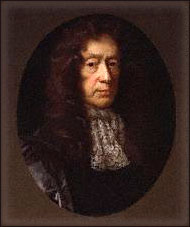|
|
|
|

On the Death of E. Waller, Esq.
How, to thy Sacred Memory, shall I bring
(Worthy thy Fame) a grateful Offering?
I, who by Toils of Sickness, am become
Almost as near as thou art to a Tomb?
While every soft, and every tender Strain
Is ruffl'd, and ill-natur'd grown with Pain.
But, at thy Name, my languisht Muse revives,
And a new Spark in the dull Ashes strives.
I hear thy tuneful Verse, thy Song Divine;
And am Inspir'd by every charming Line.
But, Oh! ————
What Inspiration, at the second hand,
Can an Immortal Elegie Command?
Unless, like Pious Offerings, mine should be
Made Sacred, being Consecrate to thee.
Eternal, as thy own Almighty Verse,
Should be those Trophies that adorn thy Hearse.
The Thought Illustrious, and the Fancy Young;
The Wit Sublime, the Judgment Fine, and Strong;
Soft, as thy Notes to Sacharissa sung.
Whilst mine, like Transitory Flowers, decay,
That come to deck thy Tomb a short-liv'd Day.
Such Tributes are, like Tenures, only fit
To shew from whom we hold our Right to Wit.
Hail, wondrous Bard, whose Heav'n-born Genius first
My Infant Muse, and Blooming Fancy Nurst.
With thy soft Food of Love I first began,
Then fed on nobler Panegyrick Strain,
Numbers Seraphic! and, at every View,
My Soul extended, and much larger grew:
Where e're I Read, new Raptures seiz'd my Blood;
Methought I heard the Language of a God.
Long did the untun'd World in Ign'rance stray,
Producing nothing that was Great and Gay,
Till taught, by thee, the true Poetick way.
Rough were the Tracts before, Dull, and Obscure;
Nor Pleasure, nor Instruction could procure.
Their thoughtless Labour could no Passion move;
Sure, in that Age, the Poets knew not Love:
That Charming God, like Apparitions, then
Was only talk'd on, but ne're seen by Men:
Darkness was o're the Muses Land displaid,
And even the Chosen Tribe unguided straid.
Till, by thee rescu'd from th' Egyptian Night,
They now look up, and view the God of Light,
That taught them how to Love, and how to Write;
And to Enhance the Blessing which Heav'n lent,
When for our great Instructor thou wert sent.
Large was thy Life, but yet thy Glories more;
And, like the Sun, did still dispense thy Power,
Producing somthing wondrous every hour:
And, in thy Circulary Course, didst see
The very Life and Death of Poetry.
Thou saw'st the Generous Nine neglected lie,
None listning to their Heav'nly Harmony;
The World being grown to that low Ebb of Sense,
To disesteem the noblest Excellence;
And no Encouragement to Phophets shewn,
Who in past Ages got so great Renown.
Though Fortune Elevated thee above
Its scanty Gratitude, or fickle Love;
Yet, fallen with the World, untir'd by Age,
Scorning th'unthinking Crowd, thou quit'st the Stage.
|
Source:
Behn, Aphra. The Works of Aphra Behn. Vol. 1. Janet Todd, Ed.
Columbus: Ohio State University Press, 1992. 289-290.
 | to Works of Aphra Behn |
Site copyright ©1996-2011 Anniina Jokinen. All Rights Reserved.
Page created by Anniina Jokinen on June 23, 2006. Last updated on March 3, 2011.
|
|
|